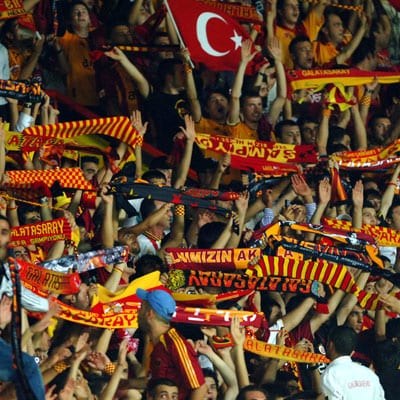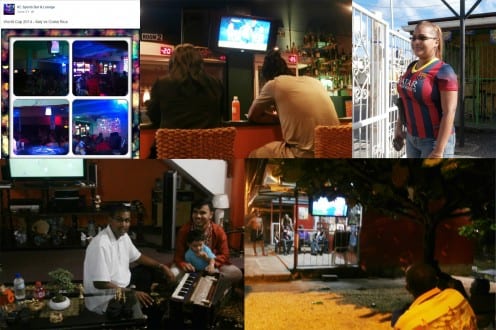“Turks have no other friends besides the Turks” – a Turkish saying
By Elisabetta Costa, on 27 June 2014

Galatasary fans. (Photo: Federico Mera CC)
My colleagues and friends around the world are talking a lot about the World Cup. I’ve been reading Italian and English newspapers and news about the World Cup dominates the front page. I often check my Facebook page and my friends from Italy, UK, France, North and South America, Lebanon have all been writing comments about it, even if their national football team isn’t playing. My memories of the last World Cup, when I was in Lebanon, are very clear. I was in Beirut in summer 2010 and I remember very well how Lebanese football fans were preparing themselves for the matches: flags everywhere, big screens in many cafés, people wearing team t-shirts, shouting in the street and singing to celebrate the victory of their favourite team (which was Brazil in most cases). In those days both men and women were continuously commenting the World Cup and they were cheering passionately. Lebanon is a post-colonial country and the way people were intensely following other country’s football teams had to do with the culturally legacy of their colonial history.
In contrast to Beirut and many other places in the world, in Mardin, none of my 200 Facebook friends has written a single comment about the World Cup. Men who are football enthusiasts watch the matches at home, but they do not passionately support any football team. They do not care about it. No flags, no clothes, no signs about the World Cup neither in public spaces, nor in the private. Almost nobody watches matches in cafes’ because the matches are available for free on the public TV channel TRT 1, and they are played late in the evening or at night local time. So people prefer to comfortably sit and watch them at home.
I couldn’t watch matches with locals because a woman can’t sit together with men late in the evening in a private house. And women do not care at all about football; a lot do not even know what the World Cup is. The only thing I could do was ask the reasons for the lack of interest, and in most cases it was simply seen as absolutely normal and natural, something that did not need any additional explanations. Others gave me technical justifications:
“This year the World Cup is boring; it doesn’t give any emotions!! Players are not playing well. Look at Italy for example, they are so boring. They wait for Balotelli to make a goal. This is not football. But other teams are not doing better, they are even worse!”
Someone else told me he was supporting Holland, Spain or Portugal for no reason in particular. Some boys who are usually interested in football were not aware of the existence of a World Cup, nor the existence of football played outside of Turkey. One 8 year old child exclaimed: “I am Galatasary’s fan, Galatasary will win!”. A male supporter of AKP (the current ruling party in Turkey) told me not to follow the World Cup because he disapproves of all the money involved in gambling, as it is forbidden in Islam. Another man in his mid-thirties who also supports AKP looked me in the eyes and with a very disclosing look and in a low voice said to me:
“Nobody will tell you the real reason why they are not interested in the World Cup because they can’t! And they do not want to hurt you! But people do not care about the World Cup because there is no countries close friend with Turkey involved in it. Who should we support? Should we support Holland or Portugal? Or Costa Rica? We do not even know where Costa Rica is. They are so far and different from us and they are not Muslim. If for example Azerbajan or other Muslim countries culturally close to us were playing we would have been much more involved, but this is not the case”.
In Mardin, the World Cup is followed as a form of private and individual entertainment. People do not express publicly support for one team or another not offline, nor on social media. Men watch football matches as they can watch a serial TV show, within their own homes and they do not discuss it publicly. In Mardin, the World Cup does not constitute a public arena where national and local collective identities are expressed and articulated. The reason of this has probably to do with the specificity of Turkish national identity, which is built on the idea of a singular Muslim nation that is under continual threat from foreign Western countries. Being a fan of a non-Muslim foreign football team is not something that is plausible here. I haven’t investigated the way the Kurds relate to football and nationalism, but the Arabs living in Mardin who consider themselves proud Turks are involved in many forms of Turkish Muslim nationalism. And not paying attention to the World Cup is one form.
One of my Arab friends, who is also a football fan, posted a picture of his favourite team, Galatasary, with a very touching poem dedicated to his favourite players on his Facebook wall the night before the start of the World Cup!
THE WORLD CUP ON SOCIAL MEDIA WORLDWIDE
This article is part of a special series of blog posts profiling how social media is affecting how ordinary people from communities across the planet experience the 2014 World Cup.
- Brazil: “Why aren’t they protesting?”: low-income Brazilian’s views on the World Cup
- Chile: Seeing red: watching the World Cup in Northern Chile
- China (North): Online and under the covers: the World Cup and social media in rural China
- China (South): “Watch the World Cup – watch the fun and the world”
- India: Football World Cup 2014: Observations from Panchagrami
- Italy: ‘We are more united for the World Cup than for Christmas!’: the World Cup in Italy
- Trinidad: “It ain’t ova till its ova” – Spectacular sports and social media: the World Cup in El Mirador
- Turkey: “Turks have no other friends besides the Turks” – a Turkish saying
- United Kingdom: Englishness, the World Cup and the Glades
 Close
Close











